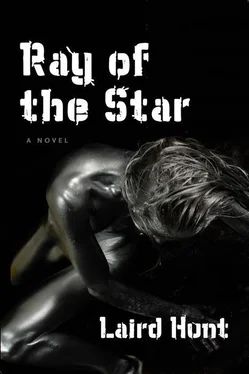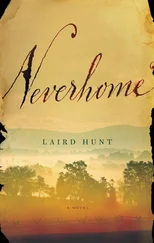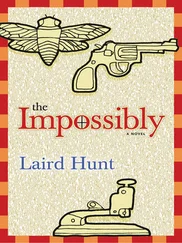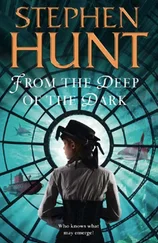“I’m very glad too,” Harry said, hardly meaning it, and as he walked along beside Ireneo, he found himself thinking with longing of being caught for a few minutes in Señora Rubinski’s web, of listening to her and nodding and contributing the odd syllable here and there, of admiring the photograph of her husband she liked to take out of a purple silk wrapping she had put around it and show people, and then, at an appropriate moment, of stepping past her and into the entryway of his building and beginning to climb the creaking stairs in his new shoes, but instead, here he was: chilled, out of breath, and more than a little sick to his stomach, negotiating one markedly empty street after another with this Ireneo, who still hadn’t said where they were going and had nothing to recommend him besides his eyes, cheekbones, and pleasant way of drinking sparkling water, and yet he, Harry, kept walking and even blurted, as if to affirm how happy he was at this turn of events, that the bags he was carrying were the result of a shopping expedition he had undertaken that afternoon, a particularly inane remark that Ireneo countered with unadulterated silence, which did not prevent Harry from following up with the observation, in an instance of “over-sharing” if ever there was one, that he suffered from a profound sleep disorder to do with his legs, one that affected some five percent of the world’s population and made sustained mental and physical activity indispensable if he was to relax enough to sleep, although this time Ireneo turned and looked at him, unblinking, for several seconds, before saying, politely but noncommittally, “I see,”
“I’ve just tried acupuncture in an attempt to deal with it as well as other problems,”
“And did you find it effective?”
“I just went the once, yesterday,”
“Ah,”
“Then I bought a bell,”
“A bell,”
“The kind you ring at hotels and doctor’s offices if you need help,”
“I see,”
so that the upshot of Harry’s attempts at drawing out his companion was that he felt slightly worse than he had before he had spoken, but even when Ireneo at last held open a green carriage door that gave onto a cobblestone courtyard at the end of which Harry perceived a large, dimly lit window filled with unmoving people dressed in somber colors, standing with their backs to him, which Ireneo announced as their destination, so far was Harry from mounting any resistance that he momentarily took the lead as they crossed the courtyard and went in through a small door next to the large window and joined the crowd of, yes, very nearly unmoving people, who were dressed entirely in something akin to mourning, so that Harry, in looking at their backs and shoulders, felt his eyes falling into familiar chasms, black openings in the dim air, which felt to him chillingly consummated mere moments after Ireneo had shut the door behind them, when he heard a click and the room was plunged into a darkness that seemed to explode out of the black clothing and that remained unmitigated long after it seemed to Harry that his eyes should have adjusted to it.
Harry was no stranger to lightless chambers, in fact for whole months he had spent his free time, i.e, the hours not passed in his gray bedroom or in his slowly decomposing cubicle at work, in a chair placed dead-center in a windowless room in the basement of his former house, where he had unscrewed the lightbulb and would sit, hoping that in the miasma of black he had created the conditions would be right — though right for what he wasn’t certain: some shift, some alteration, perhaps some new dispensation that would allow him to walk out of this world and into some other — but after a time he had begun to find himself troubled by the blackness, the mockery it made of his eyes, the sounds it seemed to heighten, small scratching noises, bits of breathing he couldn’t trace, tufts of cold air on his ear or toe, and he had begun avoiding the windowless room, indeed had long ago left the chair sitting there and locked it up, like he had now done with his entire house, forever, which is what he began to wish he could do here, even though he had only just arrived, and while he was thinking this and other things, an old woman wearing what appeared to be an illuminated lampshade on her head appeared in the depths of the room and began walking toward him, and it struck Harry that the crowd that had been there must have dispersed, because her path toward him was unimpeded, and before he could take a precautionary step backwards she was standing in front of him with her eyes shut, permanently or not he could not have said, as the light cast by the lampshade or whatever was in it was imperfect at best, but this didn’t matter because then the woman began humming, something vaguely incantatory, and as she did so her lampshade went off and lampshades began to flicker around the edges of the room, where the people had apparently positioned themselves, causing their faces to float for a moment like ruined petals, Harry thought, amidst the blackness, with the effect that he began to feel as if he were floating just a little along with them, so that when the old woman stopped humming and said, “Now I will tell you what it is you have come to hear,” Harry heard it from on high, as it were, and answered more loudly than perhaps the situation merited, although he understood quickly enough that this was not what caused the old woman to throw open her eyes, quickly look him over, then yell, “Lights out!” whereupon she vanished leaving a globular afterimage that danced before Harry’s eyes long after Ireneo had hustled him back out of the doors they had come in through and out onto the street, where, as the pale yellow thing still bobbed before him, Ireneo gesticulated and rolled his turquoise eyes and said, “It was her, I knew it, I should have known it, they told me to bring the one with the broken face, it was her,” and for a moment they both, Harry thought, looked into the yellow globe before them and saw the handsome woman from the café sitting cross-legged inside it, flecks of silver sparkling like tinfoil on her face, which didn’t stop him from saying to Ireneo, “Who, who was her?” and Ireneo from bowing, apologizing, turning on his heel, and walking away.
Harry found so appealing the idea that his sparklingly clean but manifestly still-broken face had led Ireneo to mistakenly summon him instead of the silver woman to the ceremony of the lamps, as he called her and it as he lay in bed fighting his legs later that night and then the next morning over tea and miniature pastries, that, after trying and failing several times to find the mysterious house again, he began doubling up on his appearances at the café in hopes of encountering either her or Ireneo, but the world had swerved away from or swallowed that trajectory, and he saw neither of them, and no one he spoke to at the counter of the bar could call to mind the tall man with the turquoise eyes or the woman with the flecks of silver on her face, and by and by he again found himself beating hasty retreats to his bed, ringing his bell, dodging or not dodging Señora Rubinski, murmuring greetings to his neighbors and wandering the streets of the city or sitting on one of its wide beaches or stumbling around its often oddly shaped plazas, which were invariably constructed around statues and/or fountains: focal points for the eye that might otherwise have been pulled away into the shadows that held sway along the jagged periphery, thought Harry, one day when he was feeling particularly susceptible to what he called the loathsome generalities, abstractions like “everyone” and “everything,” that crushed whatever came in their way, whether it was the everyone associated with the office, the everyone who announced that the period for grieving had long since expired and that it was high time for one to get off one’s sorry ass and come back to the cubicle, as it were, or the everything associated with the stars and moon, the earth and oceans, the red sandstone yawing in monstrous slabs out of the calm green slopes, the snow that covered, froze, and quieted it all, the world, in short, that entered through your burning eyes and bludgeoned your sorry soul— So much that cuts our legs out from under us —“I couldn’t agree more,” said a man just after Harry had thought this, as he stood beneath a striped green awning that looked out through a bright drizzle over a fringe of evergreen bushes to a monument to some group or other of the once-honored dead, and although the man was speaking to the woman next to him and not to Harry, Harry looked in his direction and thought, You’re just saying that, and without missing the proverbial beat the man said, “Quite the contrary, I might have said the same thing myself and in just those words,”
Читать дальше












